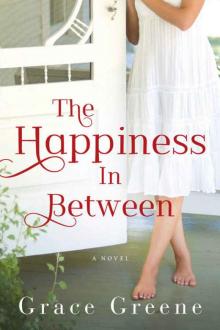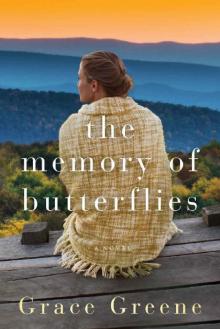- Home
- Grace Greene
The Memory of Butterflies: A Novel Page 11
The Memory of Butterflies: A Novel Read online
Page 11
It was a sweet, loving scene. Maybe George Bridger hadn’t meant this as a twofold solution, but rather threefold. For him, for us, but also for the child. The safety and love of this child.
Her clothing fit easily into a drawer in my dresser. I returned to the living room and considered waking them. A nap this time of day might make sleeping hard tonight, but I let them be. It was obvious we were going to have a guest, at least for this night.
In my room, I removed the blanket from the side rail of the small crib, the one that had blocked my view of the bed’s interior. I stripped the small sheet. It had needed washing for close to two years. Then I removed the mattress and the hardboard beneath it. I unhooked the hinges and folded the crib. This crib was too small for a child of two years. I stored it in the back room.
Where should the child sleep tonight? With Gran? I didn’t think so. Maybe on the sofa where she could see that Gran was nearby? Or with me? There was plenty of room in the double bed, and I didn’t mind the idea, but thus far the child hadn’t shown any signs of warming up to me. Maybe after supper, she’d be more open and approachable.
Simple was best. Eggs and toast and juice. Jelly, of course. Gran and I’d put up that jelly several years ago. The eggs came with the grocery delivery. Luckily, the last delivery had been recent and the milk was fresh.
I started singing as I cooked. It had been a while. I had a fair voice, and Gran used to sing with me before her breath got so short. Neither of us had done much singing in the last couple of years. This felt odd yet exhilarating. I was on the third verse into Gran’s favorite, “Church in the Wildwood,” and was planning to launch into “Barbara Allen” next as I stirred the eggs. The smell of toast filled the air, and I felt eyes on me.
Big eyes. Eyes so richly dark despite the amber flecks that they reminded me of the brown waters of Cub Creek when the sunlight flickered through the branches overhead and reflected on the moving surface.
Softly, I said, “Hello there. How are you, sweetie? Hungry?”
She looked down at her feet.
I poured the eggs into the pan and then stepped away long enough to pull out a chair. “You can sit here if you’d like.” I turned back to the stove as if I couldn’t care less.
Gran groaned as she moved from her bed, then her cane tapped the wood floor.
“What do I smell? Breakfast for supper?”
“Yes, ma’am,” I called back.
“What do you think about that, my sweet Ellen?” Gran said.
A pang of guilt seized me. This child had her own name. Her own family. An identity. How much damage was this doing?
Gran said, “I’ll pay a visit to the ladies’ room and be right back.”
The child had a momentary look of panic on her face as Gran left the room, but she stayed seated. I took a chance. I set the glass of juice in front of her and asked kindly, “What’s your name, honey? What would you like me to call you?”
She took a sip of the juice.
I tried again. “Are you worried about your grandpa? Your mommy and daddy?”
The child, her little fingers hardly spanning the circumference of the glass, eyed me warily and set the drink carefully back on the table.
Gran was already returning from the bathroom. The floor planks squeaked as she progressed. Record time, it seemed to me.
Once more I asked, “Trisha? That’s your name, right, honey?”
“Toast. Jelly. Please.” She spoke in a toddler voice, turning her l’ s into w’s and leaving off the last consonants.
As Gran shuffled into the kitchen and pulled out her chair, the child fixed those creek-brown eyes on me and said, “Sweet Ellen.”
It sounded like “Swee Ewwen,” and the words and voice reached into my chest with exquisite pain. I faced the stove. I held my breath, closed my eyes, and waited for it to pass.
That night, at bedtime, the child’s lips developed a tiny tremor as she pressed them together. Her eyes were big and tinged with fear. I asked her where she’d like to sleep. I reminded her of where Gran slept, as if a soul anywhere in the house could miss that bed jutting out into the living room floor. I pointed at the sofa.
“I can make up a bed there for you.” Then I held out my hand and said, “Come with me.”
She took my hand, but in a skittish way, and I was careful not to clasp her little fingers too tightly.
I turned on the light in my room and said, “I sleep here. Used to be Gran’s room, but she wanted to be closer to the stove because she gets cold easily. So I sleep here, but you can see it’s a big bed, and there’s plenty of room. If you like, you can share my bed.”
She’d gone to the bathroom and used the toilet already on her own. Night was sometimes different for young ones, but I didn’t have any Pull-ups and hadn’t seen any evidence of them at Mr. Bridger’s place, so hopefully, bed-wetting wouldn’t be a problem.
We stood there while she took in the room. She was quiet and self-contained, such a little bit of a person. Not a big talker, for sure. I released her hand. Instead of leaving the room, she stopped in front of the bookcase. The books, I thought at first, but then saw her eyes had fastened on a rag doll. Mine. Gran had made it for me and, of course, I’d saved it for . . . Yes. For Ellen. Not this child. I’d saved it for when my Ellen would be old enough to play with it.
I picked up the doll. I cradled it in my arm and straightened her skirt and braid, then I offered it to this little girl. She took it and mumbled something. Thank you, I think she said. She walked to the living room and sat on the sofa, clutching the doll tightly to her.
Gran was already asleep. Not surprising. It had been quite a day for her. Wryly and devastatingly I thought, It’s not every day that one’s lost great-granddaughter returned home.
The child looked at me, not crying, but her dark eyes were swimming in unshed tears, and she said, “Mommy?”
Wrong. This was very wrong. This child was asking where her mother was. I knelt by the sofa and smiled kindly. “Tomorrow, sweetie. We’ll find her tomorrow.”
I covered a pillow with a pillowcase and pulled the afghan from the back of the sofa. There was no nightie in her stuff, and I wasn’t about to strip her down to her undies and expect her to sleep like that in a strange house with people she didn’t know. It wouldn’t be civilized. I moved to take off the shirt she was wearing because I could see there were multiple layers on her little body, but she pulled back and nearly disappeared into the folds of the sofa. If she wanted to sleep in her day clothes, virtually her whole wardrobe, then she could. If she were still here tomorrow afternoon, I’d figure out something better.
The exterior doors were securely locked, and my bedroom door stayed open, as usual.
I changed into a nightgown, and after a last check on Gran and the child who appeared to be sleeping, I tucked myself in. I tossed a lot. Too much was on my mind. Too many emotions swirled in my head to think clearly about what was best to do. Did I really have a choice? It wasn’t only about me. In fact, for me, this probably wasn’t a good thing no matter how one justified it. To get attached, to have the responsibility . . . my plate was already full with Gran.
The clouds moved off. It was still night, but the moon was full, and suddenly its light parted the night and lit the pathway through the house to my bed. The mattress shifted as a small weight climbed on board. I opened my eyes a sliver and saw her looking at me. Those dark eyes, so deep, stared at me. I felt her loneliness. Not truly fear. If she was afraid, it was because she was alone. I pulled the covers up over her shoulders ever so gently.
She put her thumb in her mouth and closed her eyes. Her long lashes brushed her cheeks.
I whispered softly, “Good night, sweet girl. Sleep well.”
She was a child in need of shelter and comfort. What harm could kindness do?
As I’d promised myself, and whatever fates might have been listening and might seek to hold me accountable, I drove into town to call the hospitals. It wasn’t easy to
find one old man who’d gone to a hospital in an area that stretched from Charlottesville to Richmond. I tried the most obvious ones, but no one was willing to confirm he was there . . . or they didn’t know . . . or he hadn’t been. That was the problem.
It was time to visit the man in town. He was “our” lawyer, after all, and speaking to him would surely be more discreet than straight-out walking into the sheriff’s office.
His office was in a small stone building. Grand had pointed the building out to me on a shopping trip before he died. The name on the door read DUNCAN BROWNE, ESQ., ATTORNEY AT LAW.
A well-dressed lady was seated at the desk in the main room. I asked to see Mr. Browne.
“I’m Hannah Cooper, the granddaughter of Ed and Clara Cooper. He knows them.”
“Nice to meet you, Miss Cooper. What would you like to see Mr. Browne about? Perhaps we could make an appointment?”
“Is he here?” I experienced a brief flashback of having stood at an etched-glass storm door while a certain boy’s mother tried to keep me away from her son. I bit my lip to keep from speaking harshly. I didn’t like gatekeepers any better than I liked information brokers. “I need help finding our neighbor Mr. Bridger. I think he went to the hospital, but I don’t know which.”
“You could check with the sheriff’s department.”
I didn’t answer. She was right, of course, in one respect, but on the other hand, it would not serve my purpose—a purpose I certainly could not explain. In that silence, a man spoke.
“Miss Cooper?”
I turned. A man stood in the office doorway. Behind him was an impression of dark wood, leather, and books.
He moved forward, extending his hand. “I’m Duncan Browne. I imagine your grandparents have spoken of me?”
They had, but rarely. In my head, he was the Man in Town. He wasn’t wearing the brown suit I’d imagined but a nice dark-blue one with a silky green tie. Gray was sprinkled through his hair, and his face was tanned and lined. His eyes were clear. I liked him instantly.
He cast a quick glance at the desk lady, then looked back at me. “Would you like to come into the office? Is there something I can help you with?” As I followed, he asked, “May I call you Hannah?” Then he motioned me toward a chair facing his desk.
“Of course.” I sat in the offered chair, and he settled into his own.
“How’s your grandmother?”
“She’s well. Our neighbor George Bridger told us he was going to the hospital but didn’t say which one. I tried calling around but no luck.” I looked down. I didn’t like lying. Even omissions were a form of lying. Prevarication, Grand had said to me, was a fancy word but still a lie.
“I don’t know whether he went to Charlottesville or Richmond. I presume Charlottesville, but I couldn’t locate him. I was in town, and I thought of you, that you might be able to find out where he is. He’s not back home yet, and I’m worried.”
“George Bridger. I know of him. As Aggie suggested, the sheriff can probably help.”
I bristled. “He’s old and sick, but as far as I know, he hasn’t broken any laws. He’s private. I don’t believe he’d appreciate my bringing the authorities into his business.”
Mr. Browne frowned, but then it slowly shifted, and a smile grew on his face. “Spoken like your grandfather.” He leaned back in his chair and tapped the shiny desktop with his finger. “He and George Bridger—I always thought of them as the old guard. The county has grown, changed, over the last decade especially. Your grandfather was one of the originals—those folks who lived in the back of beyond and minded their own business. They didn’t invite or appreciate interference. George Bridger was garrulous. He spoke a lot when he was in a chatty mood, but he actually said very little. Your grandfather spoke very little and meant every word.” He leaned forward again. “It was my pleasure to have known him. Your grandmother, too. You say she’s doing well?”
I wanted to get Mr. Browne back on track. “She is. I’m not here about her, but rather Mr. Bridger.”
“I’ll make some calls and find out about him. Shall I call the house number with what I find out?”
“That will be fine. If Gran answers, ask for me. I don’t want to worry her.”
“Your grandmother calls from time to time about business. She’s not much given to chitchat. I hope you don’t mind my asking, but are you doing well out there? Do you have what you need?”
His questions made me uneasy. I fidgeted. “We’re good.”
“Your daughter? Ellen? How is she?”
I must’ve moved suddenly because I heard a thud and realized my purse was on the floor. I was grateful for a reason to hide my face. Leaning over, grabbing for my purse, I said, “Fine. We’re all fine.”
Suddenly questions abounded in my head. As I’d suspected, Gran hadn’t told him of our loss. I wanted to ask him why he paid our bills. Why was he involved in our lives? But asking would’ve been trespassing on my grandparents’ business and would invite him to question me further about us and our lives. I was curious, but mostly I was respectful of my grandparents and grateful we had financial support such that Gran and I had our needs met. I wanted to get out of here before I had to say more lies.
“Thank you, Mr. Browne. I’ll be waiting to hear from you.”
A day later, Duncan Browne called, and I made sure to get there first.
“I got the phone, Gran!” I turned away from the living room, going as far as the cord would stretch, and kept my voice down. “What did you find out?”
“He went to the hospital in Charlottesville.”
“How is he?”
“I’m very sorry to say that he passed. He walked into the emergency room and collapsed. They were unable to revive him.”
I was stunned.
“Again, I’m sorry to tell you like this. I didn’t want to keep you waiting on the information.”
“No, I was just thinking that George Bridger always did have his own way of doing things. I’m sorry he had to go through this alone.”
“I understand.”
“What about a funeral?” A thought popped into my head. “Do you know whether his son is arranging a service?”
“I don’t know his son, but I don’t think so. Apparently Mr. Bridger had already arranged to be cremated. I was able to obtain the name of his executor, a local pastor, who said Mr. Bridger didn’t want a service. He didn’t mention the son. There’s a cousin by marriage, I believe, but she lives out of state somewhere. As I recall, his son left home long ago. Is that your understanding?”
This was a chance for me to say, His son visited him recently, and before Mr. Bridger died he gave me his granddaughter to look after. But I squelched the words before they were uttered.
I said, “As far as I know, he’s still gone. Thank you for your help. If you hear more, will you let me know?”
“I will. If you or your grandmother need anything, please call me. And you’re welcome to come by anytime you need to.”
We disconnected. I stood there clutching the receiver. I’d turned back toward the living room and saw Gran and Ellen flipping through the pages of a storybook and commenting on the illustrations.
Mr. Bridger certainly did have a knack for doing things his own way and in his own timing.
But so many losses. Our own, then Mildred, and now Mr. Bridger. Grand, too. A whole generation was passing.
I decided not to tell Gran about Mr. Bridger. She was happy these days because of Ellen.
Trisha, I reminded myself.
For the time being, Gran was happy, and I wasn’t inclined to shake that up. Fate would or wouldn’t send Liam or his wife back here. If they returned, I’d do the right thing. Whatever that was.
For a year after George Bridger left his granddaughter on our porch in Cooper’s Hollow, our lives were blessed. Gran stood straighter and moved better. She laughed a lot. So did I. The county sent visiting nurses by to check on Gran from time to time. They were professional, but they
couldn’t take the place of Mildred. Plus, it wasn’t always the same nurse. Even so, the general consensus was a thumbs-up on Gran’s improvement, and Ellen charmed them. Our sweet Ellen had found her voice, and she didn’t stop talking except when she was working in the garden with me. She’d talk then, too, but in a whisper. I asked her why, and she said she didn’t want to frighten the bunnies and squirrels and birdies.
I showed her how to tell the difference between the plants and the weeds, but she liked the weeds, too, so her help was more in the way of companionship than useful action. One day in late June, almost two months after she’d come to us, she was holding a spade for me while I resorted to digging out a stubborn weed with my fingers, when I heard her whisper, “Mommy.”
She was staring at an orange butterfly that had fluttered nearby and landed on the tip of her spade. Ellen’s eyes had opened so wide they were nearly round. Her lips were pursed as if she’d been caught in midwhisper or was about to offer a kiss.
The butterfly moved its wings and fluttered away.
For the rest of the day, she wanted to talk about the butterfly, butterflies in general, and everything butterflies. Why are they orange? Why aren’t they all orange? How do they fly? Why do they like flowers? I didn’t understand everything she said, but I answered every “why” as best I could.
When July arrived and, with it, the awful anniversary, I paid a special visit to the first Ellen’s grave. I tidied the rocks arrayed around it and put a sprig of wildflowers on the earth above her. The small, unskilled wooden cross I’d placed there still stood, but it was unmarked by name or date. I’d never been able to bring myself to write her name on something so inadequate. Now, I thought, it was just as well.
Peace, I thought. Peace had eluded me for too long. I shed a few tears and said good-bye, then returned to the house to find Gran telling a story and Ellen giggling.
The year passed swiftly. It sped through the leaves changing colors, the leaves dropping, and Ellen asking question after question. The same was true of the snow that fell in December, and Christmas was merrier than I ever remembered it. Soon February rolled around, and since I didn’t know her exact birthday, we used the one I did know, and so Ellen turned three.

 Wildflower Hope (The Wildflower House)
Wildflower Hope (The Wildflower House) The Happiness in Between
The Happiness in Between The Memory of Butterflies: A Novel
The Memory of Butterflies: A Novel Clair (Beach Brides Book 4)
Clair (Beach Brides Book 4)